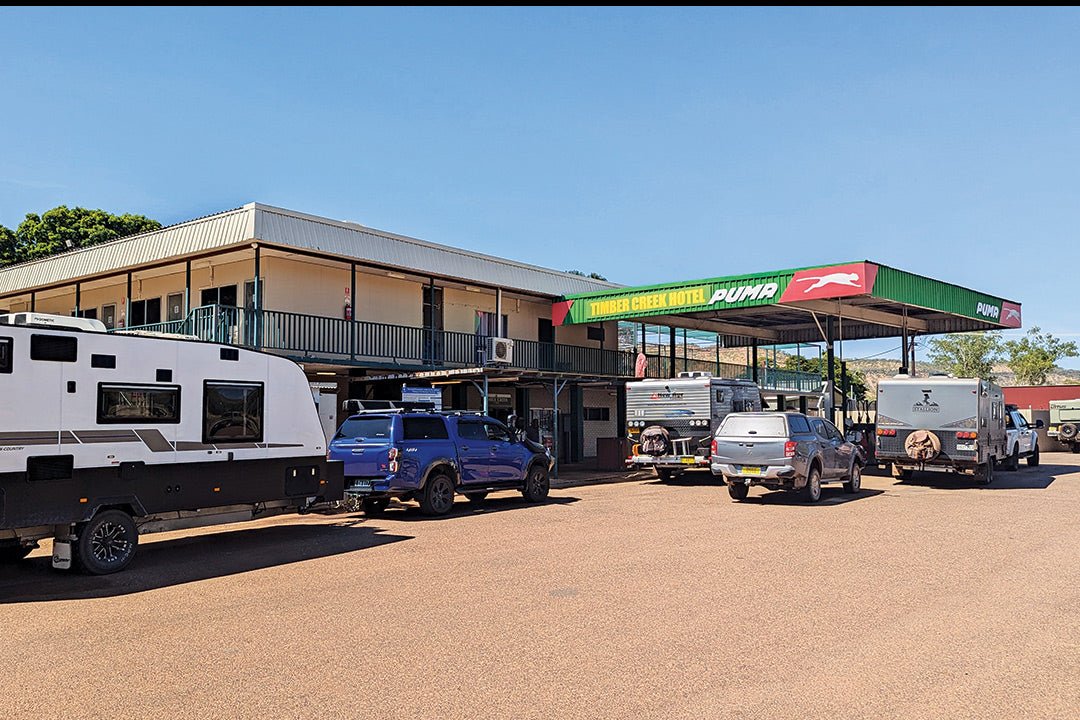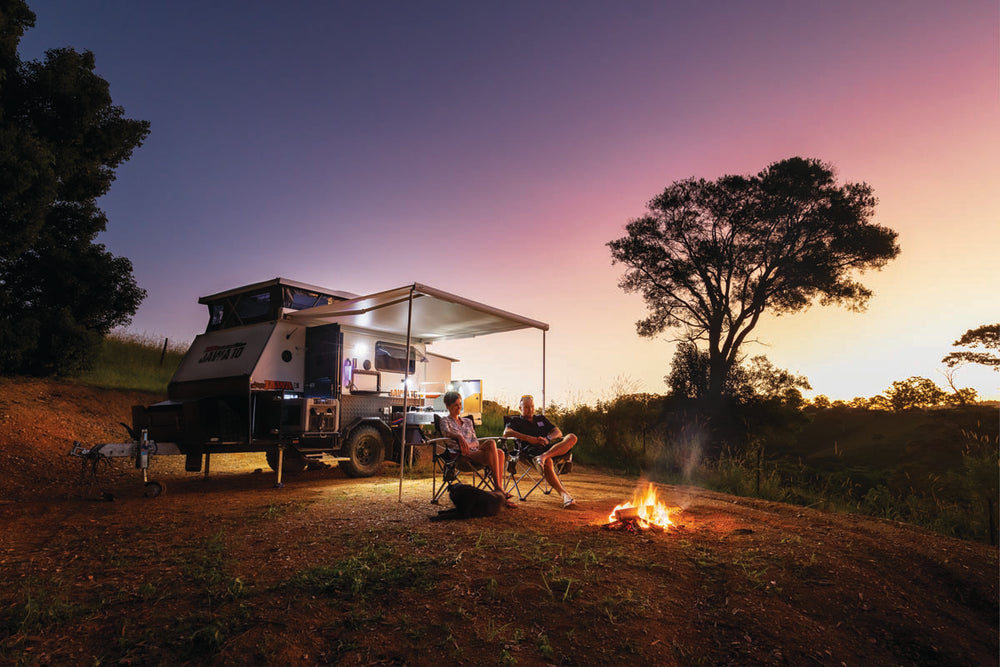

Editor and experienced caravanner John Ford shares his 10 tips to enable a better caravanning experience for everyone on the road.
Australia boasts a diverse and expansive array of travel opportunities right at our doorstep, so it’s no wonder that thousands of us embrace the caravanning lifestyle. From the red, dusty tracks of the Kimberley to the winding coastline of the Great Ocean Road, we relish the freedom of the open road and the joys of discovery.
However, owning a van brings responsibilities. Whether we like it or not, the wider world perceives us as a community, and it doesn’t take much to realise that not everyone is fond of us. There is a growing chorus of frustration among fellow road users and campers regarding a lack of etiquette and respect.
So, here are some no-nonsense guidelines for a better caravanning world — some principles that are more than just good manners; they are essential to ensure safety, a happy experience and continued access to our favourite places.
1. Use a UHF radio
One of the most underused tools in a caravanner’s arsenal is the humble UHF radio. Channel 40 is the universally recognised transport channel for truck drivers and many caravanners. It’s not just a source of entertainment; it’s a lifeline for communication on the road.
Tuning in to Channel 40 while travelling, especially on regional highways, helps you stay informed about road conditions, hazards and upcoming wide loads. More importantly, it assists in coordinating overtaking safely. A simple, “Come round when you’re ready, mate,” to a truckie or fellow caravanner stuck behind you goes a long way in keeping the peace and preventing risky passes. Simple handheld 5W radios with a magnetic antenna are relatively cheap. Don’t be shy; most truckies appreciate the call. If you call a truck to pass, wait until they are alongside and then back off to make a safe pass.
 Communicate with trucks and other caravanners via UHF radio
Communicate with trucks and other caravanners via UHF radio
2. Don’t be the overtaking lane offender
We’ve all seen it. A caravan is towing slowly — 80km/h on open roads — and then, when a rare overtaking lane finally appears, they speed up to 100km/h or more, making it nearly impossible for anyone behind to pass without excessive speed. I believe it’s because they see a wider road that feels safer to travel faster, but it shows a lack of awareness of following traffic. It’s the single most complained-about aspect of caravanning, and it’s dangerous and thoughtless.
Letting someone pass won’t kill you but failing to slow down might. You’re creating frustration and increasing the risk of accidents. Never speed up in a passing lane — period. If someone wants to overtake, let them. It’s not a race or a test of your ego, so like the welcome sign to Byron Bay: “Cheer up, Slow Down, Chill out.”
3. It’s not a race
While some caravanners might be accused of slowing the traffic flow on major roads, others want to turn excursions on the dirt into their version of the Dakar Rally. Driving anywhere at excessive speed is dangerous and selfish and that’s even more true off the bitumen. No vehicle was designed to tow a van on gravel and corrugated roads at speed, yet we see thoughtless behaviour every year on the Gibb River Road and at events like the Birdsville Big Red Bash. Travel so you can stop in time for a vehicle approaching from the opposite direction, so they aren’t forced off the road or splattered with your flying rocks. If you want to overtake in dusty conditions, then call on the UHF to get clarity about the road ahead. If you can’t see, then overtaking is just plain stupid. It’s supposed to be fun so please plan your trip and make time to enjoy the scenery.
 Towing a van at excessive speeds on gravel and corrugated roads is dangerous
Towing a van at excessive speeds on gravel and corrugated roads is dangerous
4. Convoy conduct: Leave a gap
If you are travelling with other caravans, leave a gap of 60m or more because if you are too close, it is impossible for anyone behind to overtake a string of rigs safely. Leaving a gap allows others to pass you safely and helps prevent road rage incidents and high-risk overtaking. It’s also the law in many jurisdictions.
Keep an eye on your mirrors, check for faster vehicles approaching from behind, and look for safe opportunities to let them pass. Use your UHF to communicate with your mates. If a queue of vehicles is forming behind you, find a safe spot to pull over and let them through.
5. Rest areas — share the space
Remote overnight stays are the backbone of outback travel, so share the space. Unless they are crowded, avoid pulling up right next to someone who is already set up.
Stay out of truck-only rest areas, including in service centres. They are needed for legally mandated breaks, and if you don’t leave room, they may have to drive on illegally to find a place to stop.
6. Leave no trace
No one likes finding a lunch spot or an overnight camp that’s littered with garbage and tissues, but it’s a growing trend. So, no matter where you are — in a national park, a free camp or a caravan park — let’s agree to leave it better than we found it. We see more and more places closed to access because local authorities are sick of the mess and damage, so it’s in our interest to keep them maintained.
Take your rubbish with you or place it in designated bins that have sufficient room. Avoid trampling gardens or creating new tracks. Keep fires in existing pits and avoid draining grey water onto sensitive areas or where it will create a bog. Adhering to local camping guidelines isn’t just respectful — it’s what keeps these beautiful places open to future campers.
 Take your rubbish with you
Take your rubbish with you
7. Dump point decorum
Only use designated dump points because offloading your chemical toilet waste or compostable bags in the bush is one of the worst offences ruining the reputation of all caravanners. If you must, bury waste deep and away from streams and infrastructure.
Please leave some space for those at the dump point. It’s not the most popular pastime, and not everyone wants to engage in idle chatter when emptying their cassette.
If a hose is provided, clean the area after use, or use your own water supply. Nobody wants to deal with your mess, and poor hygiene here can make people sick.
8. Campground courtesies
Most of us love setting up in isolation with acres of free space, but sometimes we have to camp next to others in a caravan park or a popular bush camp. Unless there’s limited space, avoid camping directly on top of someone else. We need to keep noise to a minimum and respect privacy. Not everyone might appreciate your loud playlist or footy match. Respect camp perimeters by avoiding walking through the site and limiting the range of kids and pets.
If you are looking for a yarn, read the room. Some folks like to share; others might need some peace and quiet.
Ghost camping is a growing trend, and it stinks, robbing others of access to some fantastic places. If you cannot make the booking deadline, please notify the camp host in good time so that someone else can take over the site. Authorities are fining ghost campers, and it’s about time.
 Share the space in crowded camps
Share the space in crowded camps
9. Don’t just wave, help
A sign that we are part of the nomadic community is the one-finger wave we give as we pass another van. It hints at a spirit of mateship that adds to the appeal of the lifestyle, but unless we are prepared to help someone in trouble, then it’s a facade.
One of the cringeworthy aspects of caravanning is watching a group laugh at the attempts of new campers reversing into a tight van site, then shouting advice from the sidelines. It’s not a great welcome to the community. How about: “Mate, it’s a hard site they have put you on, can we do anything to help?”
If someone is broken down or has a tyre problem, a helping hand might save their day.
10. Support the locals
Many country towns rely on tourists for their livelihood and welcome those who spend a few dollars, rather than just filling up their tanks, using the toilets and dumping rubbish without even buying a coffee. The local servo might not be the cheapest, but that fuel must come from a long way away. If we don’t support the butcher, baker and local produce store, they won’t be around the next time we do a lap.
For many of us, visiting Indigenous lands and communities will be a new experience where we need to follow unfamiliar cultural protocols. Ask permission before you photograph anything, listen to advice and never trespass on restricted or sacred sites.
Lots of us log our experiences on social media, and I wonder if we sometimes overshare. Some places can’t cope with hordes of visitors, so if you find a secret spot, maybe keep it that way. If you receive excellent service in a small town, acknowledge it, but don’t risk damaging a business’ reputation by being overly critical if a young employee mixes up the pie order.
 Respect the local laws
Respect the local laws
Final thoughts on caravanning behaviour
If you own a van, you know the feeling of freedom that the lifestyle brings, all made possible by thousands of kilometres of roads, shared public infrastructure and the welcome embrace of regional Australia. It’s a lifestyle worth preserving, and the more we care, the longer we will be able to enjoy it.
THE NEXT STEP
If you want to learn the latest caravan news, find the most innovative new caravans, tow vehicles and camping gear or get inspired to plan your next caravanning trip to some of Australia’s best getaway destinations, subscribe to our weekly newsletter. We promise to send you only the best content.
Related articles:
A guide to hitching and unhitching your caravan
Caravan safety 101: 10 tips for safer driving







